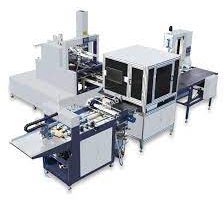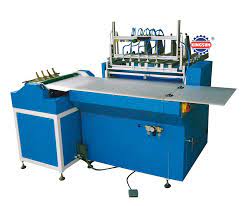Skip to content

The hard box case manufacturing sector is on the cusp of a technological revolution, with the integration of Artificial Intelligence (AI) and 3D printing technologies poised to redefine production paradigms. This innovative amalgamation promises to enhance precision, efficiency, and customization in hard box case maker machinery, marking a significant leap forward from traditional manufacturing methods. This article delves into the transformative impact of AI and 3D printing on hard box case production, heralding a new era of smart manufacturing that prioritizes flexibility, sustainability, and unmatched quality.
- AI-Driven Design and Prototyping:
- The application of AI in the design phase of hard box case manufacturing facilitates the creation of intricate and precise designs that meet specific customer requirements with unprecedented accuracy. AI algorithms analyze design parameters and customer feedback in real-time, optimizing designs for both aesthetic appeal and functional utility. This capability significantly reduces the time and resources spent on prototyping, allowing for rapid iteration and innovation.
- Customization at Scale with 3D Printing:
- 3D printing technology introduces the ability to produce customized hard box cases on demand, eliminating the need for large inventories and enabling manufacturers to respond swiftly to specific market needs. This level of customization, from unique shapes to personalized textures and colors, is achieved with minimal adjustments to the production setup, showcasing the flexibility and scalability of modern manufacturing.
- Enhanced Material Efficiency and Sustainability:
- The integration of 3D printing in hard box case maker machinery not only optimizes material usage but also opens up possibilities for using sustainable, biodegradable materials. By precisely depositing material only where needed, 3D printing minimizes waste, while AI-driven predictive models ensure that production processes are as efficient as possible. This approach aligns with growing environmental concerns and the push towards more sustainable manufacturing practices.
- AI-Powered Quality Control:
- In the realm of quality assurance, AI algorithms offer an unmatched level of precision and consistency. By continuously learning from production data, these systems can identify and rectify potential defects much earlier in the production cycle, ensuring that every hard box case meets stringent quality standards. This not only enhances product quality but also reduces the cost and time associated with manual inspections and rework.
- Streamlined Supply Chain and Inventory Management:
- The capabilities of AI extend beyond the production floor into supply chain optimization. AI can forecast demand with high accuracy, manage inventory levels, and streamline logistics to ensure timely delivery of materials and finished products. This optimization minimizes stock levels and reduces storage costs, contributing to a leaner, more responsive manufacturing operation.
- Collaborative Robots (Cobots) in Assembly:
- The assembly phase of hard box case production is further enhanced by the introduction of cobots. Designed to work alongside human operators, these robots can perform repetitive tasks with high precision and reliability, freeing up human workers for more complex and creative tasks. This collaboration between humans and machines enhances productivity and workplace ergonomics.



